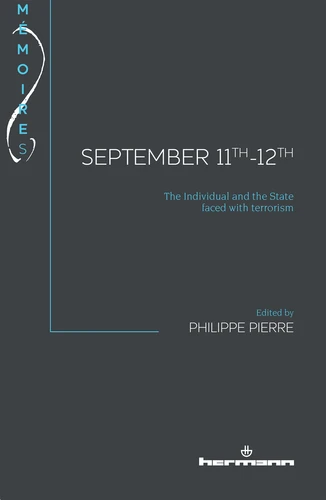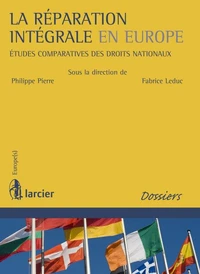Philippe PIERRE exerce, depuis plus de douze années, dans le domaine de la gestion des ressources humaines et, après avoir été notamment Directeur des Ressources Humaines de PCI/Division Luxe de L'Oréal (Armani, Helena Rubinstein, Biotherm, Cacharel...), puis Directeur de la formation de la Division Coiffure de L'Oréal, il a choisi de devenir consultant indépendant. Il enseigne actuellement dans plusieurs institutions internationales (Sciences-po, ESSEC, HEC Genève). Philippe Pierre a été également chercheur associé au LISE/CNRS de 1993 à 2009 et conduit des recherches sur la motivation des cadres, la gestion de la diversité, l'identité des cadres mobiles, le management interculturel, les organisations apprenantes et la sociologie de la mondialisation.
September 11th - 12th. The Individual and the State faced with terrorism
Par :Formats :
- Paiement en ligne :
- Livraison à domicile ou en point Mondial Relay estimée à partir du 17 décembreCet article sera commandé chez un fournisseur et vous sera envoyé 21 jours après la date de votre commande.
- Retrait Click and Collect en magasin gratuit
- Livraison à domicile ou en point Mondial Relay estimée à partir du 17 décembre
- Nombre de pages218
- PrésentationBroché
- Poids0.33 kg
- Dimensions15,0 cm × 23,0 cm × 1,6 cm
- ISBN978-2-7056-8704-5
- EAN9782705687045
- Date de parution24/05/2013
- CollectionMémoire(s)
- ÉditeurHermann
Résumé
Among the commemorations that marked the tenth anniversary of the terrorist attacks of September 11th was held the conference “September 11th-12th, the Individual and the State Faced with Terrorism” (French Embassy in Washington D.C. April 11th and 12th, 2011). This new trans-Atlantic chapter of the program “Memory and Memorialization” (Partner University Fund) was original in three ways : A transdisciplinary approach, calling to speak specialists in neuroscience, psychoanalysis, psychiatry, history, but also legal experts, law historians, even political science and public policy specialists ; An approach at once retrospective and projective : September 11th is calling upon the competence of social as well as legal historians.
Because the terrorist act concerns as well its author as its victim, the experience of psychological development of trauma specialists is also necessary. Projecting out to the future, it is important to discover the society’s reaction to terrorism and the curative possibilities discovered by neuroscience ; An approach with a growing focus : the personal construction of the victim, whose trauma ends, thanks to various cerebral dynamics, is coming as a first level.
Construction via intermediation is the second level, bridging the gap between the individual and his/her society. Lawmakers try to codify damages relative to the suffering endured, indemnization measures are adopted, and incriminations changed. As a third level, collective construction, by the big narrative that shapes our understanding of the event, and finally by the State itself that crafts its own memory.
Because the terrorist act concerns as well its author as its victim, the experience of psychological development of trauma specialists is also necessary. Projecting out to the future, it is important to discover the society’s reaction to terrorism and the curative possibilities discovered by neuroscience ; An approach with a growing focus : the personal construction of the victim, whose trauma ends, thanks to various cerebral dynamics, is coming as a first level.
Construction via intermediation is the second level, bridging the gap between the individual and his/her society. Lawmakers try to codify damages relative to the suffering endured, indemnization measures are adopted, and incriminations changed. As a third level, collective construction, by the big narrative that shapes our understanding of the event, and finally by the State itself that crafts its own memory.
Among the commemorations that marked the tenth anniversary of the terrorist attacks of September 11th was held the conference “September 11th-12th, the Individual and the State Faced with Terrorism” (French Embassy in Washington D.C. April 11th and 12th, 2011). This new trans-Atlantic chapter of the program “Memory and Memorialization” (Partner University Fund) was original in three ways : A transdisciplinary approach, calling to speak specialists in neuroscience, psychoanalysis, psychiatry, history, but also legal experts, law historians, even political science and public policy specialists ; An approach at once retrospective and projective : September 11th is calling upon the competence of social as well as legal historians.
Because the terrorist act concerns as well its author as its victim, the experience of psychological development of trauma specialists is also necessary. Projecting out to the future, it is important to discover the society’s reaction to terrorism and the curative possibilities discovered by neuroscience ; An approach with a growing focus : the personal construction of the victim, whose trauma ends, thanks to various cerebral dynamics, is coming as a first level.
Construction via intermediation is the second level, bridging the gap between the individual and his/her society. Lawmakers try to codify damages relative to the suffering endured, indemnization measures are adopted, and incriminations changed. As a third level, collective construction, by the big narrative that shapes our understanding of the event, and finally by the State itself that crafts its own memory.
Because the terrorist act concerns as well its author as its victim, the experience of psychological development of trauma specialists is also necessary. Projecting out to the future, it is important to discover the society’s reaction to terrorism and the curative possibilities discovered by neuroscience ; An approach with a growing focus : the personal construction of the victim, whose trauma ends, thanks to various cerebral dynamics, is coming as a first level.
Construction via intermediation is the second level, bridging the gap between the individual and his/her society. Lawmakers try to codify damages relative to the suffering endured, indemnization measures are adopted, and incriminations changed. As a third level, collective construction, by the big narrative that shapes our understanding of the event, and finally by the State itself that crafts its own memory.








